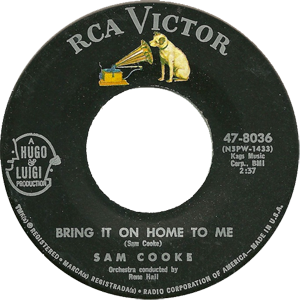
"Bring It On Home to Me" is a song by American soul singer Sam Cooke, released on May 8, 1962, by RCA Victor. Produced by Hugo & Luigi, and arranged and conducted by René Hall, the song was the B-side to "Having a Party". The song peaked at number two on Billboard's Hot R&B Sides chart, and also charted at number 13 on the Billboard Hot 100. The song has become a pop standard, covered by numerous artists of different genres. It is one of The Rock and Roll Hall of Fame's 500 Songs that Shaped Rock and Roll.

Cute 'n' Country is the second studio album by American country music artist Connie Smith. It was released in October 1965 via RCA Victor Records and contained 12 tracks. Cute 'n' Country contained a mixture of original songs and cover versions by other country artists. Featured on the album was the top ten single "I Can't Remember". Cute 'n' Country was Smith's second album to top the Billboard country LP's chart.

Here Comes My Baby is a studio album by American country music artist Dottie West. It was released in June 1965 on RCA Victor Records and was produced by Chet Atkins. It was West's debut studio album as a recording artist and was issued following the success of the title track in 1964. The latter song won a Grammy Award in early 1965 which prompted the issue of the album. Here Comes My Baby would start a series of studio recordings West would release for RCA.

The discography of American country artist Skeeter Davis contains 32 studio albums, 18 compilation albums, 59 singles, 53 lead singles, six collaborative singles, two other charted songs and two additional appearances. Davis was first one half of the duo, The Davis Sisters before embarking on a solo career with the RCA Victor label. Her second single was 1957's "Lost to a Geisha Girl", which reached the top 15 of the American Billboard Hot Country Songs chart. It was followed in 1959 by the top five country selection, "Set Him Free". The same year, Davis's debut studio album was issued on RCA Victor titled I'll Sing You a Song and Harmonize Too. Her career momentum continued to build in 1960 with two top five back-to-back singles: "(I Can't Help You) I'm Falling Too" and "My Last Date ". Both selections also climbed into the Billboard Hot 100 top 40. They were featured on Davis's second studio album called Here's the Answer. Between 1961 and 1962, Davis had top ten Billboard country singles with "Optimistic" and "Where I Ought to Be".

Sounds of Christmas is the second holiday-themed album by vocalist Johnny Mathis and the first of his 11 studio projects for Mercury Records. His first yuletide effort, 1958's Merry Christmas, relied heavily on popular holiday carols and standards, but this 1963 release also included two new songs as well as covers of some lesser-known recordings by Andy Williams and Bing Crosby.
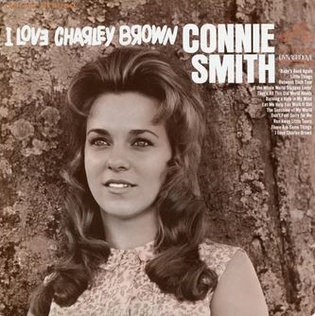
I Love Charley Brown is the tenth studio album by American country singer Connie Smith. It was released in April 1968 via RCA Victor and featured 12 tracks. The album reached the top 20 of the American country albums chart. It was described as a collection of pop-inspired country songs. Included were four cuts written by Smith's longtime songwriting collaborator, Dallas Frazier. Among his cuts was one of the album's three singles, "Run Away Little Tears". Along with Frazier's cut, the two additional singles included reached the top ten of the American country songs chart. The album was met with favorable reviews from critics.

Just One Time is the sixteenth solo studio album by American country singer Connie Smith. It was released in June 1971 via RCA Victor and contained ten tracks. The album was named for the lead single of the same name, which reached the top five of the North American country charts in 1971. The album itself would chart in the top 20 of the American country LP's chart following its release. Additionally, Billboard magazine gave the project a positive reception when reviewing it in 1971.

Marilyn Maye McLaughlin is an American singer, musical theater actress and masterclass educator. With a career spanning eight decades, Maye has performed music in the styles of cabaret, jazz and pop music. She has received one nomination from the Grammy Awards and had commercial success as a recording artist.

So Nice is an album by American pop singer Johnny Mathis released through Mercury Records on September 16, 1966. The singer included a trio of musical numbers from Man of La Mancha in this set as well as songs from Funny Girl, Kismet, and On a Clear Day You Can See Forever, shows that he had recognized on previous releases. Mathis also covers recent imports from France and Brazil and offers a rendition of a 1944 hit record as part of the mix.
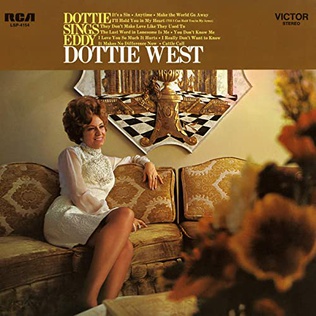
Dottie Sings Eddy is a studio album by American country music artist Dottie West. It was released in March 1969 on RCA Victor Records. The album was co-produced by Chet Atkins and Danny Davis. The project was a tribute to country artist, Eddy Arnold, whom West considered an inspiration in her career. West covered 11 tracks that were originally recorded by Arnold throughout his career.

Christmas in My Home Town is a studio album by American country artist Charley Pride. It was released in November 1970 via RCA Victor Records and was produced by Jack Clement. The album was Pride's first collection of holiday music and his ninth studio recording, overall. The project originally contained ten tracks in its initial release, but was re-released with additional tracks in 2013. Christmas in My Home Town received positive reviews from critics following its release.
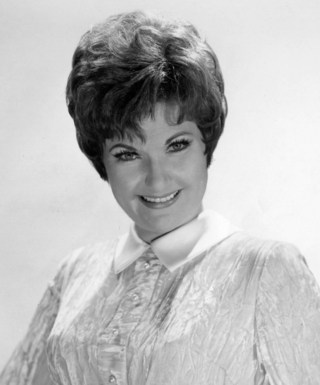
The discography of American singer Marilyn Maye contains 13 studio albums, two compilation albums, two live albums, 13 lead artist singles, two promotional singles and four additional album appearances. Her debut studio album appeared in 1961 called Marilyn...the Most. Signing with RCA Victor, her second studio album was released in 1965 titled Meet Marvelous Marilyn Maye. It was followed in 1966 by the live album, The Second of Maye, and a studio album, The Lamp Is Low.

Meet Marvelous Marilyn Maye is a studio album by American singer Marilyn Maye. It was released in August 1965 via RCA Victor and contained 12 tracks. It was the second album of Maye's career and her first with the RCA label. It contained songs from musicals and also featured covers of jazz vocal standards. It was reviewed positively by Billboard magazine following its release in 1965.

The Second of Maye is a live album by American singer Marilyn Maye. It was released in April 1966 via RCA Victor and it contained 12 tracks. The project was recorded in a live format at The Living Room, a performance venue located in New York City. It was the second album of Marilyn Maye's issued by the RCA Victor label and her first live album. It was met with favorable reviews following its release.

The Lamp Is Low is a studio album by American singer Marilyn Maye. It was released in October 1966 via RCA Victor and contained 12 tracks. The album was a mixture of both original material and cover songs. Of its cover songs were recordings from 1960s films and jazz standards. Among its Jazz tracks was the album's title track. It received positive reviews from Billboard and Cashbox magazines. The album has been considered a "classic" disc since its original release.
"Sherry!" is a song composed by James Lipton and Laurence Rosenthal. It was first recorded in 1966 by American singer Marilyn Maye whose version was released as a single by RCA Victor. It later appeared in the Broadway musical also titled Sherry!. The show premiered in 1967, however, it was never recorded until 2004. "Sherry!" was then recorded for the cast album by American television actress Carol Burnett.

A Taste of "Sherry!" is a studio album by American singer Marilyn Maye. It was released in February 1967 by RCA Victor and contained 12 tracks. The album featured Maye's first commercially successful singles: "Cabaret" and "Sherry". Both were featured in Broadway musicals of the same names and both reached the top ten on the American adult contemporary chart. A Taste of "Sherry!" received positive reviews from several publications following its release.
"Step to the Rear" is a song written by Elmer Bernstein and Carolyn Leigh. It was originally performed in the Broadway musical How Now, Dow Jones between 1967 and 1968. It was first recorded on an official cast album in 1968. It was notably recorded by American singer Marilyn Maye, whose version was released as a single. Maye's version reached the top five of the American adult contemporary chart and was seen on televised advertisements for Lincoln and Mercury cars. It was adapted into the University of South Carolina’s fight song as The Fighting Gamecocks Lead the Way.
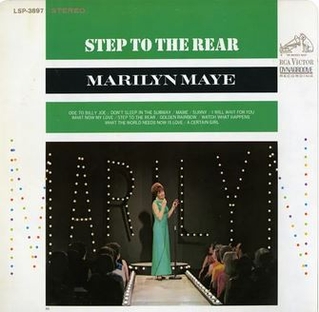
Step to the Rear is a studio album by American singer Marilyn Maye. It was released in November 1967 via RCA Victor and contained 11 tracks. Its title song was taken from the Broadway musical How Now Dow Jones and was a single for Maye in 1967. It reached the top five of American adult contemporary chart. The album itself received a positive review from Billboard magazine following its release.
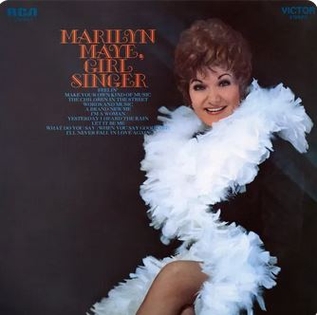
Marilyn Maye, Girl Singer is a studio album by American singer Marilyn Maye. It was released in April 1970 via RCA Victor and was the seventh studio album of her career. It was also her final album released by RCA Victor. Girl Singer contained a total of 11 tracks. Two tracks were originally singles. The 1968 single "Feelin'" became a top 20 song on the American adult contemporary chart. Girl Singer was given a positive review from Record World magazine following its release.


















